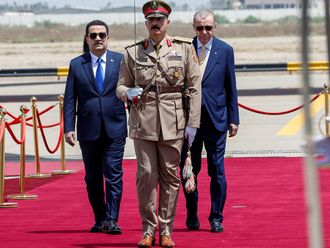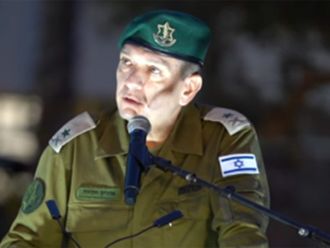Beirut: While the Lebanese Armed Forces (LAF) continued to face serious challenges in Arsal and elsewhere along the largely non-delineated and unprotected border with Syria, the Free Patriotic Movement (FPM) launched yet another theatrical media stunt on Tuesday, when it called for an extraordinary parliamentary session to “pass” a draft law whose gist would be to equip the army instead of “waiting for foreign grants”.
It was unclear why the proposal was made in the first place when the LAF was under duress although observers noted that neither General Michel Aoun nor Hezbollah Secretary-General Hassan Nasrallah referred to the military in their latest joint communiqué after their latest meeting a few days ago.
The latest FPM missive was launched by deputy Ebrahim Kanaan, who spoke after the bloc’s Tuesday conclave, and who insisted that “a Lebanese effort is needed inside state institutions and an initiative must be made to immunise the army and fulfil its needs”. Kannan criticised the Kingdom of Saudi Arabia without naming it when he declared: “We should not await the announced grants indefinitely but that does not mean that the grants are not needed,” though he wondered why there was “no extraordinary legislation to secure the army’s funding and equipment, knowing that the Army Command had prepared a draft law” towards that end.
Although Kanaan’s colourful language — as he accused senior officials of “begging” for assistance — did not mention that less than $100 million (Dh367 million) was allocated for equipment purchases in the March 2012 Najeeb Mikati Government’s budget of $1.3 billion for the LAF.
Kannan did not lament the fact that the LAF fielded 420 flag officers for a force that stood at around 60,000 men [not counting Internal Security Forces (ISF) units and other paramilitary institutions] where less than 80 were inked as far back as 1981 in various reform initiatives [in reality probably less than 20 flag officers were amply sufficient].
Western military observers noted that Great Britain, a UN Security Council permanent member and a global power of some consequence, had 46 flag officers (generals) for a force that stood at 110,000, or almost twice that of Lebanon. Importantly, Kannan did not mention that the bulk of the LAF budget went towards salaries, indemnities and allowances that, according to the Ministry of Finance, amounted to $1.64 billion in 2011 [this figure was for both the LAF and ISF].
Senior LAF officers have repeatedly asked for international assistance to bolster the institution’s capabilities and benefited from American largesse to the tune of $700 million since 2005. Critically, the United States was the only country to have been this generous until December 2013, when Saudi Arabia pledged to buy the LAF $3 billion worth of weapons and equipment from France. As of today, Paris was still negotiating with Beirut, and presumably with its primary ally in the area, Israel, over the types of weapons Lebanon may be allowed to deploy. According to the local French-language daily L’Orient-Le Jour, commission payments, allegedly in both France and Lebanon, further delayed ongoing consultations.
For its part, Riyadh pledged an additional $1 billion to pay for immediate needs, though it opted to entrust former Prime Minister Sa’ad Hariri a few weeks ago to coordinate with the government on the best means to spend these new funds against extremist groups. Caught between Syrian opposition forces that retaliated against Hezbollah’s presence in Syria and internal Lebanese political games that placed its units in harm’s way, the LAF confronted existential threats, which saw up to 36 of its soldiers and policemen abducted from Arsal during the early August clashes (see attached update on remaining hostages).
General Aoun’s FPM was aware that parliament cannot convene to conduct any business before electing a president, which added to the mystery surrounding the latest offer, although it probably was a reaction to Saudi King Abdullah Bin Abdul Aziz’s decision to wait for the presidential election before disbursing any funds. On Wednesday, the independent daily Al Nahar asserted that Riyadh delayed funding and wished to use this leverage to accelerate the election of a new head of state. In the event, the Saudi Ambassador in Bedirut, Ali Awadh Asiri, denied the accusation, insisting that the $3 billion awaited the spending mechanism under development between Lebanon and France.











